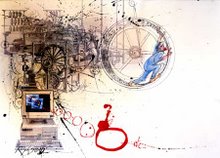From a Washington Times story -
The federal agency that tracked pork-barrel spending during the 12 years of the Republican congressional majority has discontinued the practice since Democrats took power . . .
CRS, a nonpartisan agency of the Library of Congress created to conduct research for members of Congress on legislative issues, changed its policy in February -- a month after Democrats took control of the Congress and vowed to curb the number of special-interest projects inserted into spending bills or even reports that don't require a vote. CRS Director Daniel P. Mulhollan developed the policy after consulting with "internal CRS appropriations experts" and deciding the service was redundant with what other agencies do, CRS spokeswoman Janine D'Addario said.
"His decision was strictly an internal decision," said Miss D'Addario, whose agency began providing Congress members with information on earmarks in 1994, when Mr. Mulhollan took over as director.
-snip-
Several lawmakers, particularly those who had come to rely on the agency to identify the dollar value of earmarks in appropriations and other laws, were caught off guard by the change.
"It's troubling -- I can't think of any justification for that," said Rep. Jeff Flake, Arizona Republican. "They've done good research in the past ... That's what they're here for -- the benefit of the members" of Congress.
-snip-
Republicans said they want an independent observer because pork is often in the eye of the beholder and estimates of the amount vary widely.
Citizens Against Government Waste put the figure for 2006 at $29 billion, while Republicans on the House Appropriations Committee said it was $17 billion. Mr. DeMint, citing a CRS report, said the amount totaled more than $67 billion.
Mr. DeMint said no other agency or group has the resources, expertise and access to provide Congress with data on earmarks. "This is really baffling that CRS would do this," he said.
-snip-
When Democrats took control of the 110th Congress in January, they promised to limit the long-standing and bipartisan practice of slipping pork spending into bills. But when the House last week passed a $124 billion emergency war-funding provision, the bill included as much as $20 billion in nonmilitary and pork-barrel spending, a move widely criticized . . .
-snip-
The emergency war-funding provision included $74 million for the peanut industry, $124 million for the shrimp industry and $25 million for spinach producers. The war-funding bill is proof an independent third-party observer like the Congressional Research Service is needed to keep track of earmarks, many in Congress say.
"I can tell you it's very difficult to get this type of information from the [House] Appropriations Committee -- very difficult," Mr. Flake said.
Just because the joke of an administration currently occupying the White House is Republican does not mean that we should be blind to Democratic shenanigans.
The CRS said it is cutting back because of redundancy, yet no other governmental organization is designed to digest and compile such information and present it to the Congressional body.
As indicated in the article, third party oversight of such issues gives the public an accurate picture of the economic implications of legislation, rather than the doctored numbers that communicate the message which the party in power wants to be heard.










No comments:
Post a Comment